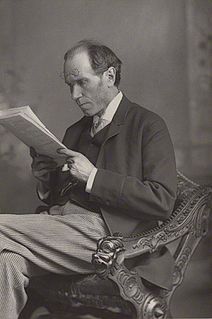A Quote by James Payn
To the truly benevolent mind, indeed, nothing is more satisfactory than to hear of a miser denying himself the necessaries of life a little too far and ridding us of his presence altogether.
Related Quotes
Good work is no done by "humble" men. It is one of the first duties of a professor, for example, in any subject, to exaggerate a little both the importance of his subject and his own importance in it. A man who is always asking "Is what I do worth while?" and "Am I the right person to do it?" will always be ineffective himself and a discouragement to others. He must shut his eyes a little and think a little more of his subject and himself than they deserve. This is not too difficult: it is harder not to make his subject and himself ridiculous by shutting his eyes too tightly.
The deeds of love are less questionable than any action of an individual can be, for, it being founded on the rarest mutual respect, the parties incessantly stimulate each other to a loftier and purer life, and the act in which they are associated must be pure and noble indeed, for innocence and purity can have no equal. In this relation we deal with one whom we respect more religiously even than we respect our better selves, and we shall necessarily conduct as in the presence of God. What presence can be more awful to the lover than the presence of his beloved?
Habit hath so vast a prevalence over the human mind that there is scarce anything too strange or too strong to be asserted of it. The story of the miser who, from long accustoming to cheat others, came at last to cheat himself, and with great delight and triumph picked his own pocket of a guinea to convey to his hoard, is not impossible or improbable.
Nothing fires the warrior’s heart more with courage than to find himself and his comrades at the point of annihilation, at the brink of being routed and overrun, and then to dredge not merely from one’s own bowels or guts but from one’s discipline and training the presence of mind not to panic, not to yield to the possession of despair, but instead to complete those homely acts of order which Dienekes had ever declared the supreme accomplishment of the warrior: to perform the commonplace under far-from-commonplace conditions.
It may be that one of our great faults in prayer is that we talk too much and listen too little. When prayer is at its highest we wait in silence for God's voice to us; we linger in His presence for His peace and His power to flow over us and around us; we lean back in His everlasting arms and feel the serenity of perfect security in Him.
The present relationship existing between husband and wife, where one claims a command over the actions of the other, is nothing more than a remnant of the old leaven of slavery. It is necessarily destructive of refined love; for how can a man continue to regard as his type of the ideal a being whom he has, be denying an equality of privilege with himself, degraded to something below himself?
Some of us need to discover that we will not begin to live more fully until we have the courage to do and see and taste and experience much less than usual... And for a man who has let himself be drawn completely out of himself by his activity, nothing is more difficult than to sit still and rest, doing nothing at all. The very act of resting is the hardest and most courageous act he can perform.
There is probably no one, however rigid his virtue, who is not liable to find himself, by the complexity of circumstances, living at close quarters with the very vice which he himself has been most outspoken in condemning -- without altogether recognizing it beneath the disguise of ambiguous behavior which it assumes in his presence.
Existence is not itself a good thing, that we should spend a lifetime securing its necessaries: a life spent, however victoriously, in securing the necessaries of life is no more than an elaborate furnishing and decoration of apartments for the reception of a guest who is never to come. Our business here is not to live, but to live happily.
It is not in our life that God's help and presence must still be proved, but rather God's presence and help have been demonstrated for us in the life of Jesus Christ. It is in fact more important for us to know what God did to Israel, to his Son Jesus Christ, than to seek what God intends for us today.






































